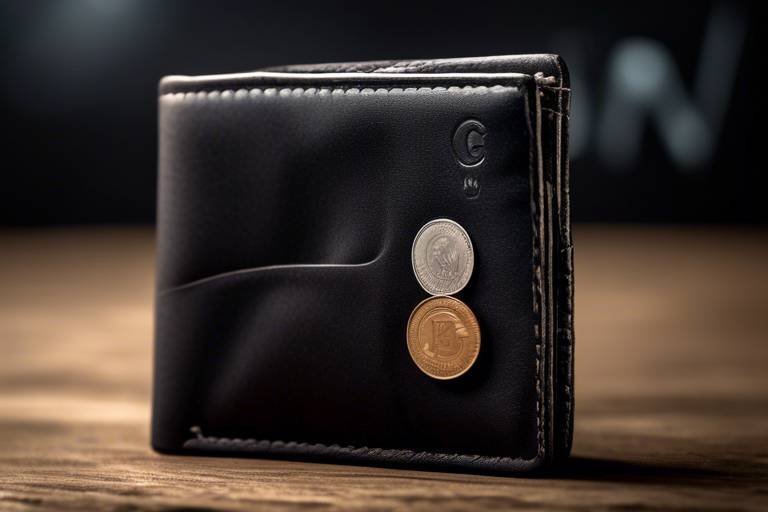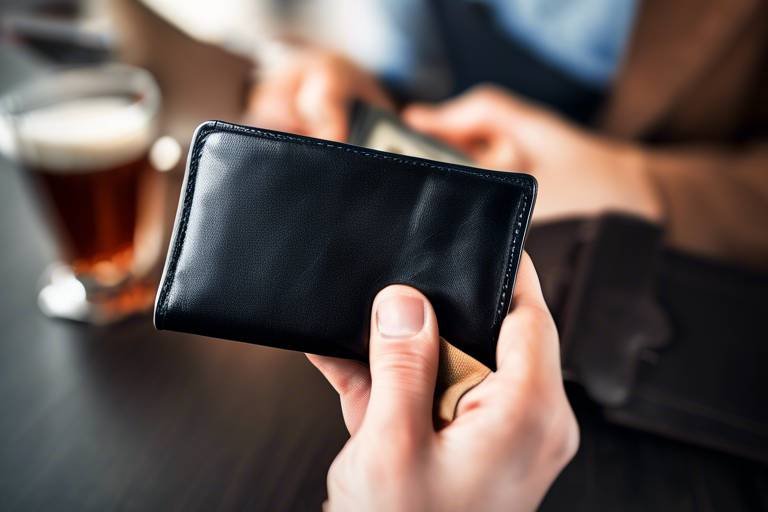How to Choose a Wallet That Supports Your Favorite Tokens
Choosing the right cryptocurrency wallet can feel like finding a needle in a haystack, especially with so many options available. Whether you're a seasoned trader or just dipping your toes into the crypto waters, understanding what to look for in a wallet is crucial. After all, your wallet is the digital vault that houses your prized tokens, and you wouldn't want just anyone to have access to it, would you?
First things first, let's talk about the importance of compatibility. Not all wallets support every cryptocurrency. Imagine buying a fancy new car but realizing it only runs on a specific type of fuel. Similarly, if your wallet doesn’t support your favorite tokens, you’ll be left in a lurch. Before you get too excited about a particular wallet, do your homework! Check if it supports the specific tokens you want to store. This ensures that you won’t need multiple wallets cluttering your digital space, which can be a hassle.
Next up is security. In the wild west of cryptocurrency, protecting your assets should be your top priority. Look for wallets that offer robust security features like two-factor authentication, encryption, and reliable backup options. Think of it as fortifying your castle before the dragons come knocking. A wallet that prioritizes security will give you peace of mind, allowing you to focus on what really matters: growing your investments.
Now, let’s dive deeper into the types of wallets available. You have hardware wallets, software wallets, and even paper wallets. Each type comes with its own set of advantages and disadvantages. For instance, hardware wallets, which store your tokens offline, offer a high level of security but may not be as convenient for quick transactions. On the other hand, software wallets provide easy access and are great for everyday use but can be more vulnerable to online threats.
| Wallet Type | Security Level | Convenience |
|---|---|---|
| Hardware Wallet | High | Medium |
| Software Wallet | Medium | High |
| Paper Wallet | High | Low |
When considering a wallet, think about how you plan to use it. Are you a day trader who needs quick access, or are you a long-term holder looking to safeguard your investments? Your usage patterns will significantly influence your choice. Remember, it’s not just about picking a wallet; it’s about finding the right fit for your lifestyle and investment strategy.
Lastly, don't forget to keep your wallet updated! Just like you wouldn’t drive a car without regular maintenance, your wallet needs updates to stay secure and functional. Ensure that you’re keeping an eye on software updates, which can include new features and security patches. This way, you’ll be able to manage your tokens effectively and stay in tune with any new cryptocurrencies that catch your eye.
- What is the safest type of cryptocurrency wallet? Hardware wallets are generally considered the safest because they store your tokens offline, away from potential online threats.
- Can I use multiple wallets for different tokens? Absolutely! Many users opt for multiple wallets to manage various cryptocurrencies more efficiently.
- How do I know if my wallet supports a specific token? Always check the wallet's official website or documentation for a list of supported cryptocurrencies before making a decision.
- Is it necessary to back up my wallet? Yes! Backing up your wallet is essential to prevent loss of access to your tokens in case of hardware failure or other issues.

Understanding Wallet Types
When diving into the world of cryptocurrency, one of the first things you'll encounter is the concept of wallets. But hold on—this isn't your traditional wallet that holds cash and cards. In the crypto realm, wallets come in various shapes and forms, each tailored to specific needs and preferences. Understanding these wallet types is crucial if you want to keep your digital assets secure while enjoying the convenience of easy access.
Let’s break it down. There are primarily three types of wallets: hardware wallets, software wallets, and paper wallets. Each type has its own unique features, benefits, and drawbacks, making them suitable for different users. Think of it like choosing the right vehicle for your journey; you wouldn’t drive a sports car to haul furniture, right?
Hardware wallets are like your personal safe, designed to store your cryptocurrencies offline. This makes them incredibly secure against online threats, such as hacking. They may require a bit of an investment, but for serious investors, the peace of mind is worth every penny. On the flip side, they can be a bit cumbersome to use for daily transactions.
Next up, we have software wallets, which are akin to having a wallet on your phone. These wallets can be mobile, desktop, or even web-based, providing quick access for everyday transactions. While they are user-friendly and convenient, they are also more vulnerable to cyber attacks. So, it’s a bit of a trade-off between convenience and security.
Lastly, we have paper wallets. These are the most old-school way of storing your tokens. Imagine writing down your private keys and addresses on a piece of paper and keeping it in a safe place. While they are immune to online hacking, they can be easily lost or damaged. So, if you go this route, make sure to keep that paper safe and sound!
To summarize, here’s a quick table that highlights the main differences between these wallet types:
| Wallet Type | Security Level | Convenience | Best For |
|---|---|---|---|
| Hardware Wallet | High | Medium | Long-term investors |
| Software Wallet | Medium | High | Daily transactions |
| Paper Wallet | High | Low | Cold storage |
In conclusion, choosing the right wallet type is essential for managing your cryptocurrency effectively. Whether you prioritize security, convenience, or a balance of both, understanding these wallet types will help you make an informed decision. So, which wallet will you choose for your crypto journey?

Security Features to Look For
When it comes to selecting a cryptocurrency wallet, the security features it offers should be at the top of your priority list. After all, the last thing you want is to wake up one day and find that your hard-earned tokens have vanished into thin air! To ensure your assets remain safe, look for wallets that incorporate a variety of robust security measures. Here are some critical features to consider:
Two-Factor Authentication (2FA) is one of the most effective ways to add an extra layer of protection. With 2FA enabled, you'll need to provide two forms of identification before accessing your wallet. This typically includes something you know, like a password, and something you have, like a smartphone app that generates a unique code. Think of it as a double lock on your front door—one is good, but two is even better!
Another essential feature is encryption. A wallet that encrypts your private keys ensures that even if someone gains access to your device, they won't be able to access your funds without the correct decryption key. It's like having a safe that only you have the combination for—no one can get in without your permission.
Additionally, look for wallets that offer backup options. In the world of cryptocurrencies, losing access to your wallet can mean losing your tokens forever. A good wallet will allow you to create backups, often in the form of a recovery phrase or seed phrase. This way, if your device is lost or damaged, you can still recover your funds. It’s like having a spare key hidden under a rock—just in case you lock yourself out!
Lastly, it’s wise to consider the wallet's development and support. A wallet that receives regular updates is more likely to address security vulnerabilities and improve functionality over time. Check if the wallet has a dedicated support team that can assist you in case you encounter any issues. Think of it as having a reliable mechanic for your car; you want someone who knows their stuff and can help you when things go wrong.
In summary, when choosing a wallet, prioritize security features such as:
- Two-Factor Authentication (2FA)
- Encryption
- Backup Options
- Development and Support
By paying attention to these features, you can significantly enhance the security of your cryptocurrency investments and enjoy peace of mind knowing your tokens are well protected.
- What is the safest type of wallet?
Hardware wallets are generally considered the safest option as they store your tokens offline, away from potential online threats.
- Can I use a software wallet for large amounts of cryptocurrency?
While software wallets are convenient, they are more vulnerable to hacks. If you hold large amounts, consider using a hardware wallet for better security.
- How often should I update my wallet?
Regular updates are crucial for security. Always keep your wallet software up to date to protect against vulnerabilities.

Hardware Wallets Explained
When it comes to securing your cryptocurrency investments, hardware wallets are often regarded as the gold standard. Imagine a vault where you can store your most precious items, safe from prying eyes and potential thieves. That’s essentially what a hardware wallet does for your digital tokens. Unlike software wallets, which are connected to the internet and can be vulnerable to hacks, hardware wallets keep your private keys offline. This offline storage dramatically reduces the risk of unauthorized access, making them an attractive option for anyone serious about protecting their assets.
But what exactly makes hardware wallets so special? First off, they provide a physical device that you can hold in your hand—think of it as a USB drive specifically designed for cryptocurrencies. This tangible aspect gives users peace of mind, knowing that their tokens are not just floating around in the digital ether. Moreover, hardware wallets often come with built-in security features, such as PIN codes and recovery seed phrases, which add an extra layer of protection. If someone were to get their hands on your device, they would still need your PIN to access your funds, making it significantly harder for them to steal your assets.
Another compelling reason to consider a hardware wallet is their compatibility with multiple cryptocurrencies. Most hardware wallets support a wide range of tokens, allowing you to manage various assets from a single device. This is particularly useful for investors who hold a diverse portfolio. However, it’s essential to check the specific cryptocurrencies supported by the wallet you choose. Not all hardware wallets are created equal, and some may only support a limited selection of tokens.
Now, you might be wondering about the drawbacks. While hardware wallets offer enhanced security, they can come with a higher price tag compared to software wallets. Additionally, the setup process may seem a bit daunting for newcomers. But don’t let that scare you away! The benefits far outweigh the initial hurdles, and the peace of mind you gain from knowing your investments are secure is priceless.
To help you understand the advantages of hardware wallets better, here’s a quick comparison of key features:
| Feature | Hardware Wallets | Software Wallets |
|---|---|---|
| Security Level | High (Offline storage) | Moderate (Online storage) |
| Convenience | Less convenient for frequent transactions | Highly convenient for daily use |
| Cost | Higher initial investment | Usually free or low-cost |
| Compatibility | Supports multiple tokens | Varies by wallet |
In summary, hardware wallets are an excellent choice for anyone looking to secure their cryptocurrency investments effectively. They offer a level of security that is hard to match, especially if you plan to hold onto your tokens for the long term. While they may require a bit of an investment and a learning curve, the benefits they provide are well worth it. So, if you’re serious about your crypto journey, consider investing in a hardware wallet to keep your assets safe and sound.
- What is a hardware wallet? A hardware wallet is a physical device that securely stores your cryptocurrency private keys offline.
- Are hardware wallets safe? Yes, they are considered one of the safest options for storing cryptocurrencies due to their offline nature.
- Can I use a hardware wallet for all cryptocurrencies? Not all hardware wallets support every cryptocurrency, so it’s important to check compatibility before purchasing.
- How do I set up a hardware wallet? Setting up a hardware wallet typically involves connecting it to your computer, installing software, and following on-screen instructions.

Popular Hardware Wallets
When it comes to securing your cryptocurrency investments, hardware wallets are often the go-to choice for many users. They offer a level of security that software wallets simply can't match, primarily because they store your private keys offline. Let’s dive into some of the most popular hardware wallets available today, each with its unique features and advantages.
One of the most well-known hardware wallets is the Ledger Nano S. This compact device supports over 1,500 cryptocurrencies, making it a versatile choice for any crypto enthusiast. Its user-friendly interface and robust security features, such as a secure chip and a built-in display, make it an excellent option for both beginners and seasoned investors alike.
Another top contender is the Trezor Model T. This wallet stands out with its large touchscreen display, which enhances usability significantly. It supports a wide range of cryptocurrencies and includes advanced security features like two-factor authentication and a recovery seed. The Trezor Model T's open-source firmware allows for greater transparency, which many users find reassuring.
For those looking for a wallet that combines security with a sleek design, the Ledger Nano X is worth considering. It offers Bluetooth connectivity, allowing users to manage their crypto on the go via a mobile app. With support for over 1,800 tokens, it’s a robust option for users who appreciate both functionality and style.
Lastly, the SafePal S1 deserves a mention. This wallet is unique because it is the first hardware wallet that integrates with a mobile app via QR codes, eliminating the need for USB connections. It supports a wide variety of cryptocurrencies and boasts a military-grade security chip, ensuring your tokens are well-protected.
Here's a quick comparison table summarizing these popular hardware wallets:
| Wallet | Supported Cryptocurrencies | Key Features |
|---|---|---|
| Ledger Nano S | Over 1,500 | Compact, secure chip, built-in display |
| Trezor Model T | Wide range | Touchscreen, two-factor authentication, open-source |
| Ledger Nano X | Over 1,800 | Bluetooth connectivity, sleek design |
| SafePal S1 | Wide variety | QR code integration, military-grade security |
In conclusion, choosing the right hardware wallet depends on your individual needs and preferences. Whether you prioritize security, usability, or the number of supported cryptocurrencies, there’s a hardware wallet out there that will cater to your specific requirements. Always remember to do your research and select a wallet that not only supports your favorite tokens but also aligns with your security expectations.

Setting Up a Hardware Wallet
Setting up a hardware wallet may seem like a daunting task, but don't worry! With a little guidance, you can have your wallet up and running in no time. First and foremost, ensure you purchase your hardware wallet from a reputable source. This is crucial because buying from an unreliable vendor can expose you to risks, such as receiving a compromised device. Once you have your wallet in hand, it's time to get started.
Begin by connecting your hardware wallet to your computer or mobile device using the provided USB cable or Bluetooth connection. The first thing you'll notice is that most hardware wallets have a simple interface, often guided by on-screen instructions. Follow these prompts carefully to initialize your device. During this setup process, you will be asked to create a PIN code. This code is your first line of defense, so make sure it's something secure yet memorable.
Next, you will generate a recovery phrase, typically consisting of 12 to 24 words. This phrase is crucial because it allows you to recover your wallet if your device is lost or damaged. Write this recovery phrase down on paper and store it in a safe place—never share it with anyone! Think of it as the key to your treasure chest; if someone gets hold of it, they can access your funds.
| Step | Description |
|---|---|
| 1 | Purchase from a reputable source |
| 2 | Connect the wallet to your device |
| 3 | Create a secure PIN code |
| 4 | Generate and securely store your recovery phrase |
After setting up your PIN and recovery phrase, you’ll be prompted to install the wallet's companion software on your device. This software is essential for managing your cryptocurrencies, allowing you to send and receive tokens seamlessly. Once installed, follow the setup instructions to pair your hardware wallet with the software. This usually involves confirming transactions on the device itself, adding an extra layer of security.
Now that your hardware wallet is set up and paired with the software, it’s time to fund it. You can do this by transferring cryptocurrencies from an exchange or another wallet. Just remember to double-check the wallet address before making any transfers. It's like sending a letter; if the address is wrong, it could end up in the wrong hands!
Lastly, don’t forget to regularly check for firmware updates for your hardware wallet. Manufacturers often release updates to enhance security and add new features. Keeping your wallet updated is like giving it a tune-up to ensure everything runs smoothly. By following these steps, you'll not only set up your hardware wallet successfully but also protect your digital assets effectively!
- What is a hardware wallet? A hardware wallet is a physical device that securely stores your cryptocurrency offline, making it less vulnerable to online threats.
- How do I recover my wallet if I lose my device? You can recover your wallet using the recovery phrase you generated during the setup process.
- Are hardware wallets safe? Yes, hardware wallets are considered one of the safest ways to store cryptocurrencies, as they keep your private keys offline.
- Can I use a hardware wallet for multiple cryptocurrencies? Many hardware wallets support multiple cryptocurrencies, but always check compatibility before purchasing.

Software Wallets Overview
When it comes to managing your cryptocurrency, software wallets have emerged as a popular choice among users for their convenience and accessibility. These wallets are applications that can be installed on your computer or mobile device, allowing you to easily send, receive, and manage your tokens with just a few taps or clicks. Imagine having your digital assets at your fingertips, ready to transact whenever you want—this is the allure of software wallets.
One of the biggest advantages of software wallets is their user-friendly interfaces, which cater to both beginners and seasoned traders alike. You don’t need to be a tech wizard to navigate through these applications. Most software wallets come with intuitive designs that make it simple to perform transactions. However, while they offer ease of use, it’s essential to be aware of the potential risks involved.
Unlike hardware wallets, which store your private keys offline, software wallets are connected to the internet, making them more vulnerable to hacking attempts and malware. This is why security features are paramount when selecting a software wallet. Look for wallets that offer two-factor authentication, encryption, and regular updates to safeguard your assets. Think of it like locking your front door: just because you’re home doesn’t mean you shouldn’t take precautions to keep your valuables safe.
Another aspect to consider is the variety of software wallets available. They typically fall into two categories: desktop wallets and mobile wallets. Desktop wallets are installed on your computer and provide a robust platform for managing your cryptocurrencies, while mobile wallets are designed for on-the-go transactions. Each has its own set of features tailored to different user needs. For instance, if you’re someone who frequently makes transactions, a mobile wallet might be more suitable, offering the flexibility to trade anytime, anywhere.
But wait, there’s more! Some software wallets also come with built-in exchange features, allowing you to swap one cryptocurrency for another without needing to go through a third-party exchange. This can save you time and possibly even money on transaction fees. However, always do your research and ensure that the wallet you choose is reputable and has a track record of security.
In summary, while software wallets are a fantastic option for those who prioritize convenience, it’s crucial to understand the balance between usability and security. By taking the necessary precautions and staying informed about the latest security practices, you can enjoy all the benefits that software wallets have to offer without compromising your assets.
- What is a software wallet? A software wallet is a digital application that allows users to store, send, and receive cryptocurrencies using their computer or mobile device.
- Are software wallets safe? While software wallets offer convenience, they are more vulnerable to hacking than hardware wallets. It’s essential to choose a wallet with strong security features.
- Can I use a software wallet for all cryptocurrencies? Not all software wallets support every cryptocurrency. Be sure to check which tokens are supported before selecting a wallet.
- What are the differences between desktop and mobile wallets? Desktop wallets are installed on computers and provide a more robust platform, while mobile wallets are designed for transactions on the go.

Compatibility with Tokens
When diving into the world of cryptocurrency, one of the most crucial aspects to consider is the compatibility of your wallet with various tokens. Not all wallets are created equal, and understanding this can save you a lot of headaches down the line. Imagine you’ve just bought a shiny new digital asset, only to find out that your wallet doesn’t support it. Frustrating, right? That's why doing your homework before making a wallet choice is essential.
First and foremost, you need to ensure that the wallet you choose supports the specific cryptocurrencies you plan to invest in. For example, if you're a fan of Ethereum and its myriad of tokens, a wallet that only supports Bitcoin won't cut it. To help you navigate this landscape, here’s a quick breakdown of the types of wallets and their compatibility:
| Wallet Type | Supported Tokens | Best For |
|---|---|---|
| Hardware Wallet | Major coins like BTC, ETH, and ERC-20 tokens | Long-term investors |
| Software Wallet | Variety of coins, often including altcoins | Everyday transactions |
| Paper Wallet | Any coin, as long as you generate it correctly | High-security storage |
Another essential factor is the ability to add new tokens. The crypto space is constantly evolving, with new tokens emerging almost daily. A wallet that allows you to easily add new tokens or supports a wide range of existing ones can be a game changer. This flexibility means you won’t have to juggle multiple wallets, which can be a hassle and a security risk in itself.
Moreover, it’s important to keep an eye on wallet updates. Developers often release new versions of their wallets that enhance compatibility with additional tokens or improve security measures. Regularly updating your wallet can ensure you’re not missing out on new features or token support. It’s like keeping your favorite app updated on your phone; it just makes everything run smoother!
In conclusion, when selecting a wallet, always prioritize compatibility with your favorite tokens. Take the time to research which tokens are supported, and consider the wallet's ability to adapt to new additions in the crypto world. By doing so, you not only secure your investments but also enhance your overall cryptocurrency experience.
- What is the most compatible wallet for all tokens? - There isn't a one-size-fits-all answer, but multi-currency wallets like Exodus or Trust Wallet are popular choices.
- Can I use a hardware wallet for all my tokens? - Most hardware wallets support major cryptocurrencies and many altcoins, but always check the specific tokens supported.
- How often should I update my wallet? - It's best to check for updates regularly, ideally every few weeks, to ensure you’re using the latest version.

Researching Supported Tokens
When it comes to choosing a cryptocurrency wallet, one of the most critical aspects is ensuring that it supports your favorite tokens. Imagine having a treasure chest but realizing it can only hold certain types of coins; that's what can happen if you don't do your homework on wallet compatibility. Before you dive into the world of cryptocurrency, take a moment to explore the various tokens that interest you. This research will save you from the headache of managing multiple wallets or, worse, losing access to your assets.
Start by listing the cryptocurrencies you plan to invest in. This list can include popular tokens like Bitcoin, Ethereum, or Litecoin, but don't overlook the myriad of altcoins that may catch your eye. Once you have your list, visit the official websites or reputable cryptocurrency exchanges to check which wallets support these tokens. Many wallets will proudly display their supported tokens right on their homepage, making it easier for you to gauge compatibility at a glance.
In addition to checking the wallet's website, consider visiting community forums and social media groups dedicated to cryptocurrency. These platforms often provide valuable insights from users who have already navigated the wallet landscape. They can share their experiences, highlighting any hidden gems or warning you about wallets that might not meet your needs. Remember, the crypto world is vast and ever-changing, so staying informed is key.
Another essential factor to consider is the wallet's update history. A wallet that frequently updates its software is more likely to support new tokens as they emerge. In the fast-paced world of cryptocurrency, new tokens are introduced regularly, and you want a wallet that evolves with the market. Check their changelog or update notes to see how often they add new features or support for additional tokens. This proactive approach will ensure that your wallet remains relevant and functional over time.
Lastly, don't forget to consider the community support around the wallet. A wallet with a strong user base often has better resources for troubleshooting and guidance. Look for wallets that have active forums, social media presence, or customer support channels. This way, if you encounter any issues or have questions about supported tokens, you’ll have a community to lean on for help.
In summary, researching supported tokens is a vital step in choosing the right wallet. By compiling a list of your desired cryptocurrencies, checking wallet compatibility, engaging with the community, and keeping an eye on updates, you can confidently select a wallet that meets your needs. The right wallet will not only safeguard your assets but also enhance your overall cryptocurrency experience, allowing you to focus on what truly matters—growing your investments!
- What is the best wallet for beginners? - For beginners, a software wallet that supports multiple tokens is often recommended due to its ease of use.
- Can I store multiple types of cryptocurrencies in one wallet? - Yes, many wallets support multiple tokens, but always check the compatibility before making a choice.
- How often should I update my wallet? - Regularly check for updates, especially when new tokens are released or if security vulnerabilities are reported.
- What should I do if my wallet doesn’t support a token I want? - You may need to consider using a different wallet that does support that token or find a way to convert it into a supported cryptocurrency.

Updating Wallets and Tokens
Keeping your cryptocurrency wallet and tokens updated is not just a good idea; it's a **necessity**. As the crypto landscape evolves, new tokens emerge, and existing ones undergo changes that can affect their functionality and security. Failing to update your wallet can leave you vulnerable to security risks and may prevent you from accessing the latest features. Imagine driving a car without ever checking for software updates; it could lead to performance issues or even accidents! Similarly, neglecting updates for your wallet can jeopardize your investments.
So, what does it mean to update a wallet? Essentially, it involves installing the latest software version, which may include security patches, new features, and support for additional tokens. Most wallet providers regularly release updates to enhance user experience and security. Therefore, it’s crucial to stay in the loop. You can often find this information on the official website of your wallet provider or their social media channels.
Let’s break down the process into manageable steps. First, always back up your wallet before performing any updates. This is your safety net, ensuring that even if something goes wrong during the update, your tokens remain secure. Next, check the wallet provider’s website for guidance on how to update. Many wallets offer automatic updates, but some may require manual intervention. It’s like getting a new phone app; sometimes it updates on its own, and other times you have to hit that “update” button yourself!
In addition to updating the wallet itself, it's also vital to keep an eye on the tokens you hold. New tokens may be launched that could be beneficial for your portfolio, while others may become obsolete. Regularly researching and checking the supported tokens of your wallet can save you from potential headaches down the line. You don’t want to find out that your wallet no longer supports a token you’ve invested in, right?
Here’s a quick checklist to follow when updating your wallet and tokens:
- Back up your wallet before any updates.
- Check for the latest version of the wallet software.
- Review the list of supported tokens regularly.
- Stay informed about new token launches or updates from your wallet provider.
By following these steps, you can ensure that your cryptocurrency wallet remains secure and functional. Remember, in the fast-paced world of cryptocurrency, staying updated is the key to safeguarding your investments and making the most of your digital assets.
Q1: How often should I update my cryptocurrency wallet?
A1: It's a good practice to check for updates at least once a month or whenever your wallet provider announces a new version. Regular updates help ensure your wallet's security and functionality.
Q2: What should I do if my wallet doesn't support a new token?
A2: You may need to consider switching to a different wallet that supports the token or look for a multi-currency wallet that can accommodate a variety of cryptocurrencies.
Q3: Are hardware wallets easier to update than software wallets?
A3: Hardware wallets can be a bit more complex to update due to their offline nature, but they often have a straightforward process. Always refer to the manufacturer's instructions for the best results.
Q4: Can I lose my tokens during an update?
A4: If you back up your wallet properly before updating, you should not lose your tokens. However, it’s essential to follow the update instructions carefully to avoid any mishaps.
Frequently Asked Questions
- What is a cryptocurrency wallet?
A cryptocurrency wallet is a digital tool that allows you to store, send, and receive cryptocurrencies. Think of it as a bank account for your digital assets, but instead of holding physical cash, it keeps your tokens secure.
- What are the different types of cryptocurrency wallets?
There are mainly three types of cryptocurrency wallets: hardware wallets, software wallets, and paper wallets. Hardware wallets are physical devices that store your tokens offline, software wallets are applications that you can use on your computer or smartphone, and paper wallets involve printing your keys on paper for offline storage.
- How do I know which wallet is right for me?
Choosing the right wallet depends on your needs. If you prioritize security and plan to hold your tokens long-term, a hardware wallet might be best. If you want quick access for daily transactions, a software wallet could be more suitable.
- What security features should I look for in a wallet?
When selecting a wallet, look for features like two-factor authentication, encryption, and regular backup options. These features help protect your tokens from theft and loss, ensuring that your investments remain safe.
- Are hardware wallets really secure?
Yes, hardware wallets are considered one of the most secure options for storing cryptocurrencies. By keeping your tokens offline, they are less vulnerable to online threats like hacking and malware.
- Can I use a wallet for multiple cryptocurrencies?
Many wallets support multiple cryptocurrencies, but it’s crucial to check compatibility before choosing one. Some wallets are designed specifically for certain tokens, while others offer support for a wide range.
- How do I update my wallet and tokens?
Keeping your wallet updated is essential for security and functionality. Check for updates regularly from the wallet provider and ensure you are using the latest version to support new tokens and improve security features.
- What happens if I lose access to my wallet?
If you lose access to your wallet, recovery options depend on the wallet type. Most wallets provide a recovery phrase during setup. Keep this phrase safe, as it can help you regain access to your tokens if you lose your device.



















